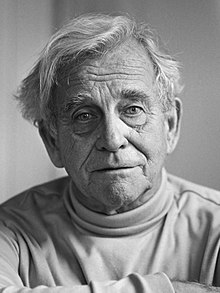Jan de Hartog
| Jan de Hartog | |
|---|---|

Jan de Hartog (1984)
|
|
| Born |
April 22, 1914 Haarlem, Netherlands |
| Died | September 22, 2002 (aged 88) Houston, Texas |
| Pen name | "F.R. Eckmar" (used infrequently) |
| Occupation | Novelist and playwright |
| Nationality | Netherlands |
| Genre | Non-fiction, Creative non-fiction, and fiction |
| Subject | (primarily) Seafaring stories |
| Notable works |
Holland's Glorie The Captain The Peaceable Kingdom: An American Saga The Hospital |
| Notable awards | Tony Award 1952 For "The Fourposter" (best play) Nominated for Nobel Prize 1972 For "The Peaceable Kingdom" Cross of Merit 1945 For wartime Merchant Marine activities |
| Spouse | Marjorie de Hartog |
|
|
|
| Signature |  |
Jan de Hartog (April 22, 1914 – September 22, 2002) was a Dutch playwright, novelist and occasional social critic who moved to the United States in the early 1960s and became a Quaker.
Jan de Hartog was born to a Dutch Calvinist Minister and professor of theology, Arnold Hendrik, and his wife, Lucretia de Hartog (who herself was a lecturer in medieval mysticism), in 1914. He was raised in the city of Haarlem, the Netherlands.
At around the age of 11, he ran away to become a cabin boy, otherwise referred to as a "sea mouse" on board a Dutch fishing boat. His father had him brought home, but shortly afterwards, Jan ran off to sea again. The experiences thus gained became material for some of his future novels, as many of his life experiences did.
At 16, he briefly attended the Netherlands Naval College. but was only there for a year. Per his own account, he was expelled, and told emphatically by his angry schoolmaster, "This school is not for pirates!"
De Hartog was a coal shoveler on the night shifts with the Amsterdam Harbor Police until 1932. As he often had time on his hands, he began to write here.
While employed as skipper of a tour boat on the Amsterdam Canals, he wrote several mysteries featuring Inspector Gregor Boyarski of the Amsterdam Harbor Police. At this time he used a pseudonym "F.R. Eckmar" (which is euphemistically translatable as "whatever." The literal meaning of 'verrek maar' is 'drop dead,' and it is commonly used like the English expression 'go and jump in the lake') for these works which ("luckily", according to the author himself) were never translated into English.
His theater career began in the late 1930s at the Amsterdam Municipal Theater, where he acted in and wrote a play.
De Hartog's career as a writer, as well as his personal life, was decisively influenced by a coincidence that occurred during World War II. In May 1940, just ten days before Nazi Germany invaded and swiftly occupied the hitherto-neutral Netherlands, de Hartog published his book Hollands Glorie (Holland's Glory, translated much later into English as Captain Jan).
The novel described the life of the highly skilled sailors on ocean-going tugboats, a specialized field of nautical enterprise in which the Dutch have always taken the lead. Without saying it in so many words, de Hartog portrayed the sailors—doing a difficult, dangerous and poorly rewarded job—as the modern successors to the bold navigators of the Dutch Golden Age.
...
Wikipedia
